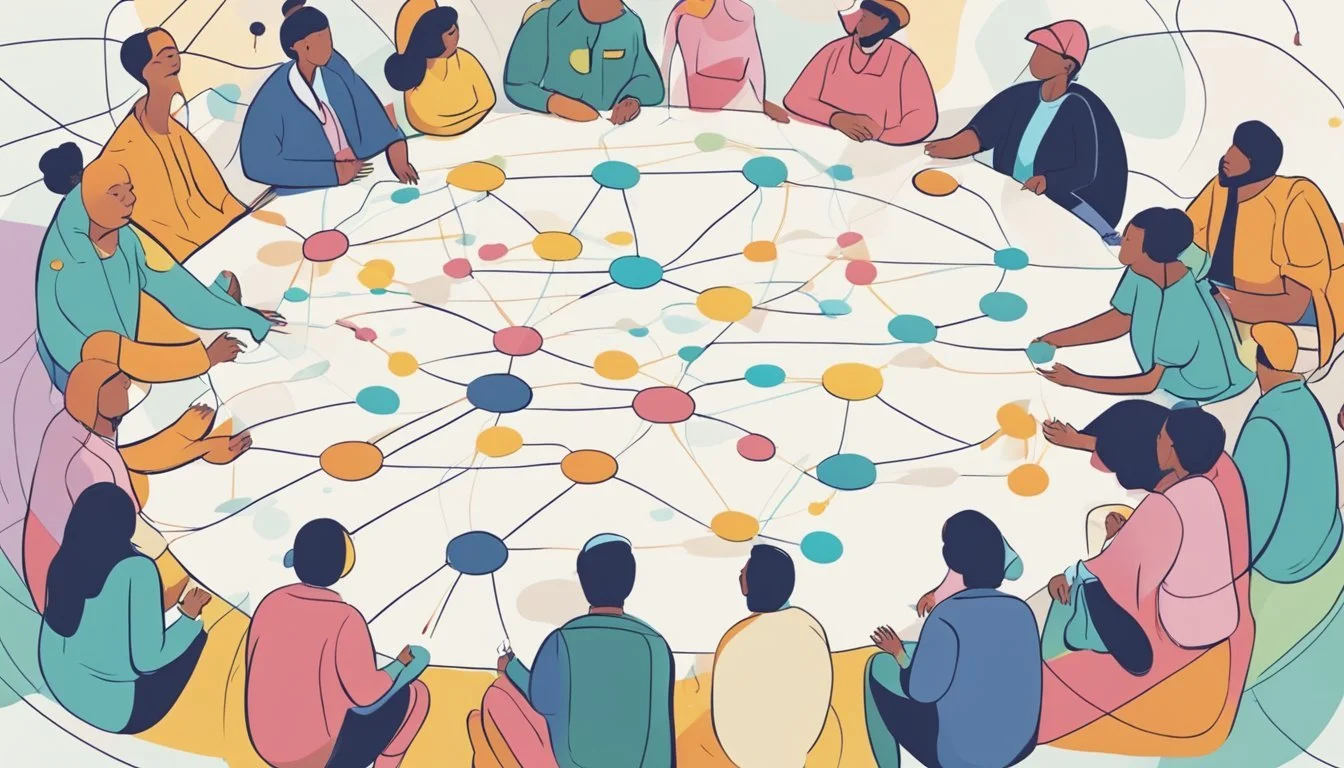15 Reasons Why Friends Who Laugh at the Same Dumb Things Build Stronger Bonds
Friendships thrive on shared experiences and mutual understanding. When friends can laugh together at the same silly jokes or trivial moments, it creates a unique bond that is both effortless and joyful. Laughter in friendship fosters a deeper connection and reinforces the sense of belonging and camaraderie.
Humor often reflects common values and perspectives, making it a powerful tool in strengthening relationships. Friends who find humor in the same things can navigate life’s challenges with greater ease, knowing they have someone who truly “gets” them and their quirks. This shared laughter becomes a comforting and enduring thread in their lives.
1) Shared Sense of Humor
A shared sense of humor forms a strong foundation for friendships. When friends laugh at the same things, it indicates a deeper mutual understanding. They relate to each other's perspectives effortlessly.
Friends who share a similar sense of humor can navigate conversations with ease. Even sensitive topics become less tense. Humor acts as a social glue, bringing people closer.
Laughter boosts positive interactions. It can make any situation enjoyable, from mundane daily routines to tricky conversations. A quick joke or a shared meme can turn an ordinary moment into a memorable one.
Scientific studies suggest that humor fosters positive communication. Sharing a laugh can make discussions more engaging and less confrontational. It creates a comfortable atmosphere for open dialogue.
Having friends with a similar sense of humor provides emotional benefits. It can ease the feeling of loneliness and boost mental well-being. According to recent findings, self-enhancing humor reduces signs of depression and loneliness, improving relational bonds.
Mutual laughter also creates lasting memories. Every inside joke and funny moment strengthens the bond. These shared experiences become the stories cherished for years to come.
2) Inside jokes
Inside jokes are a key element of close friendships. They create a unique bond that is built on shared experiences and mutual understanding. When friends share an inside joke, it indicates a level of intimacy and trust between them. These jokes often arise from funny situations or repeated references that only those involved truly understand.
The TV show "Friends" is a perfect example of how inside jokes can connect people. Characters like Phoebe and Joey frequently use amusing pseudonyms such as Regina Phalange, adding layers to their relationship dynamics. These references become an exclusive language that reinforces group identity.
Inside jokes also serve as a stress reliever. Sharing a laugh over a private joke can lighten the mood and provide comfort during tough times. This shared humor helps strengthen the emotional bond and makes the relationship more resilient.
Moreover, inside jokes highlight the importance of being present. They remind friends of the good times they've had together and anchor their relationship in positive memories. Recalling these moments can instantly bring back a sense of joy and togetherness.
In essence, inside jokes are a treasure trove of shared laughter and camaraderie. They are an essential ingredient in the recipe for lasting and meaningful friendships.
3) "Laughter is the best medicine" - Proverb
The proverb "laughter is the best medicine" emphasizes the importance of humor in everyday life. Scientific studies have shown that laughter can stimulate the release of endorphins, which are the body's natural feel-good chemicals. This can lead to improved mood and a reduction in stress levels.
Laughter has been found to reduce anxiety and depression. It enhances cognitive function and fosters resilience. These mental health benefits are essential, especially in a society where stress is a common issue.
Socially, laughter strengthens relationships by fostering connections and creating a supportive community. When people laugh together, they bond more easily and create lasting memories. This can lead to stronger, more meaningful friendships.
Physically, laughter activates the body's natural relaxation response, providing a gentle workout for internal organs and toning abdominal muscles, as noted by Dr. Gulshan Sethi from Chopra. It acts like internal jogging, promoting overall well-being.
These factors highlight why friends who laugh together often form the strongest bonds. The shared joy of humor can make any situation more bearable, acting as a powerful tool for both mental and physical health. This makes the proverb "laughter is the best medicine" not just a saying, but a practice worth embracing.
4) Boosts Creativity
Laughter has a profound ability to enhance creativity. It activates brain regions associated with problem-solving and synthesizing information. When laughing, individuals often find themselves in a more relaxed state, making it easier to generate new ideas.
Humor and laughter can help break mental blocks. This makes it easier for friends to brainstorm and come up with unique solutions. When friends share a laugh, they often feel more connected, which fosters an environment conducive to creativity.
Watching or engaging in humorous activities also stimulates cognitive functions. Research indicates that humor enhances creativity and problem-solving skills. This shared experience often leads to innovative thinking and better collaboration among friends.
In addition, laughter reduces stress hormones like cortisol. By lowering stress levels, laughter promotes a relaxed mood, allowing for a more creative mindset. Friends who laugh together, even at seemingly trivial things, often find themselves more inventive and resourceful.
Studies show that humor not only improves memory but also increases improvisational skills. This makes friends more spontaneous and ready to tackle challenges with creative approaches. Sharing laughter cultivates an environment where innovative ideas can flourish effortlessly.
5) Strengthens bond
Laughter plays a crucial role in strengthening social bonds. When friends share a laugh, it creates a sense of closeness and mutual understanding. This shared experience fosters a deeper connection that feels more genuine and relaxed.
Laughter also helps build trust. It breaks down barriers and makes it easier for friends to communicate openly. This transparency enhances the quality of the relationship, making it more resilient during challenging times.
Laughter can also serve as a positive reinforcement. When friends laugh together, it signals that they enjoy each other's company. This mutual enjoyment reinforces the bond and encourages more frequent interactions.
According to Dr. Dunbar, social laughter acts like "grooming from a distance," promoting group bonding similarly to how physical grooming strengthens bonds among primates. This shared laughter ensures that relationships remain strong and supportive over time.
Additionally, laughter can reduce social discomfort. It eases tension and makes social interactions more comfortable, helping friends feel more connected and at ease with each other. This comfort level is essential for sustaining long-term friendships.
Shared laughter also fosters a sense of belonging. It creates an in-group dynamic, where friends feel a part of something special and unique. This sense of belonging is vital for emotional well-being and group cohesion.
6) Stress relief
Friends who laugh together share a unique way to combat stress. Laughter triggers the release of endorphins, the body's natural feel-good chemicals. This not only enhances emotional well-being but also improves physical health.
Sharing humor can shift focus from stressors. Finding something funny in a stressful situation may reduce its perceived intensity. This is a key mechanism behind why funny stress-relief quotes are effective.
Humor provides a mental break. When friends laugh about the same silly things, it momentarily distracts them from their worries. This brief escape helps to reset the mind and perspective on difficult situations.
Laughing with friends also fosters connection. It creates a sense of belonging and support, which can be particularly comforting during stressful times. This sense of camaraderie is an invaluable aspect of shared humor.
The physical act of laughing can relax the muscles. This relaxation can last up to 45 minutes after the laughter subsides, leading to a reduction in physical symptoms of stress.
In moments of tension, recalling funny memories with friends can mitigate the immediate feelings of stress. These memories serve as tools for emotional resilience and coping.
7) Encourages positivity
Friends who laugh at the same dumb things promote a positive atmosphere. This shared laughter helps reduce stress, making individuals feel more relaxed and at ease. When friends find humor in the mundane, it creates a sense of joy that can brighten even the dullest days.
Laughter among friends can turn negative situations into something more manageable. By finding humor in difficulties, friends can help each other maintain a balanced perspective. This shift in outlook encourages a more optimistic approach to life’s challenges.
In a supportive environment where laughter is common, individuals feel more connected. These positive interactions can improve mental health by reducing anxiety and depressive symptoms. The bond formed through shared humor is a powerful tool in fostering overall happiness and well-being.
Furthermore, shared laughter enhances cognitive functions and fosters resilience. Friends who regularly find humor together are likely to have stronger social connections. This cohesive community built on positive interactions contributes to a more supportive and enjoyable social circle.
Including laughter in daily routines is an effective way to maintain good health. Mentally and emotionally, it helps individuals cope better with life's ups and downs. Therefore, friends who share dumb jokes contribute significantly to each other’s positive mindset and overall happiness.
8) "Together we laugh, together we thrive"
Shared laughter strengthens bonds between friends and creates a sense of unity. When friends laugh at the same things, it fosters a feeling of togetherness. This shared joy can help friends support each other through challenging times.
Laughter also has numerous health benefits. It reduces stress, boosts the immune system, and improves mood. Friends who laugh together often experience these positive effects, enhancing their overall well-being.
Friends who share humor typically communicate more easily. They understand each other's jokes and find comfort in shared experiences. This ease of communication makes building and maintaining strong friendships simpler.
Laughing together encourages a positive outlook on life. It helps friends see the lighter side of situations, reducing tension and promoting a happy environment. This positive atmosphere can be a cornerstone for personal growth and resilience.
In times of difficulty, a shared sense of humor can be a lifeline. Laughter offers a way to cope with stress and find relief, making it a crucial element in enduring friendships.
9) Promotes Mental Health
Sharing laughter with friends creates strong emotional bonds. These connections foster a sense of belonging and reduce feelings of loneliness and isolation.
Laughter releases endorphins, the body's natural feel-good chemicals. This not only lifts the mood but can also alleviate symptoms of mild to moderate depression and anxiety.
Humor helps friends cope with stress. When stressful situations arise, sharing a laugh can offer immediate relief, making tough times more manageable. It’s a powerful tool for reducing tension.
Laughter activates multiple physiological systems that decrease levels of stress hormones like cortisol and epinephrine. This biochemical reaction offers a calming effect, helping maintain mental stability.
It also enhances cognitive function. Moments of shared humor can improve focus and creativity, making it easier to tackle problems and think more clearly.
Engaging in laughter with friends strengthens resilience. Overcoming challenges becomes less daunting as laughter builds emotional strength and provides a positive outlook during adversities.
Laughter can improve social interactions. This helps boost self-esteem and creates a supportive environment, all of which can contribute to better mental well-being.
Friends who laugh together share a buoyant optimism. This collective positivity invites healthy mental habits and encourages a mindset geared towards joy and contentment.
10) Increases Trust
When friends laugh at the same dumb things, it can significantly increase trust between them. Shared laughter creates a sense of camaraderie and understanding, which serves as a foundation for trust.
Joint experiences of humor often break down barriers. When people laugh together, they reveal more about their true selves, making them feel more open and vulnerable.
This vulnerability is crucial. It fosters a safe space where friends feel they can share their thoughts and feelings without judgment. Knowing that someone else gets the joke or finds the same things funny builds an unspoken bond of trust.
Laughing at the same things also indicates similar values and perspectives. This common ground helps friends feel more aligned in their beliefs and views, reinforcing their trust in each other's actions and decisions.
Furthermore, laughter has been shown to release endorphins, which makes people feel happier and more connected. This enhanced mood can lead to greater trust and cooperation, making the relationship even stronger.
In the context of social interactions, laughter helps signal honesty and sincerity. When a friend genuinely laughs at the same things, it reassures others of their genuine intentions, fostering deeper levels of trust.
11) Improves Communication
Sharing laughter can significantly boost communication between friends. When people laugh together, it creates a positive and relaxed atmosphere. This environment makes it easier for them to express their thoughts and feelings openly.
Laughter fosters a sense of connection. This connection enhances understanding and reduces tension in conversations. It also helps individuals to be more receptive to each other’s viewpoints.
Humor can be a powerful tool in resolving conflicts. It helps to lighten the mood and defuse potentially heated situations. When friends are able to laugh at the same things, it becomes easier to navigate disagreements and reach mutual understanding.
Moreover, laughing together can strengthen social bonds. It can lead to more frequent and meaningful interactions. Those interactions help in building a stronger foundation for communication.
Laughter signals friendliness and approachability. Friends who share jokes and funny moments are more likely to maintain an open line of communication. They can address problems and share successes with greater ease.
The act of laughing together builds trust. Trust is a fundamental element in effective communication. When friends trust each other, they communicate more honestly and openly, leading to deeper and more fulfilling relationships.
A shared sense of humor can also bridge communication gaps. Even in uncomfortable situations, humor can act as a bridge to understanding and empathy.
12) Heightens Joy
Shared laughter can significantly heighten joy among friends. When individuals laugh together, the resulting sense of camaraderie and connection can amplify positive emotions. This bond helps to enhance the overall experience, making joyous moments even more memorable.
Laughter triggers the release of endorphins, the body’s natural feel-good chemicals. These endorphins create a sense of happiness and relaxation, reducing stress levels. This physiological response can make shared activities more enjoyable and satisfying.
Laughing at the same things also strengthens social connections. It reassures individuals that they are understood and appreciated by their friends. This mutual understanding fosters a sense of belonging and comfort within the group, further enhancing joyful experiences.
For more insights on the benefits of laughter on our emotional well-being, you can read this article on The Benefits of Laughter: How Humor Can Reduce Stress.
13) Better coping skills
Friends who laugh together often have enhanced coping skills. Laughter serves as an effective coping mechanism for reducing stress and anxiety. Sharing a laugh with friends can make it easier to manage negative emotions.
Humor helps individuals see difficult situations from a different perspective. This alternative viewpoint can reduce feelings of overwhelm. Engaging in laughter can also make challenging experiences feel less threatening.
Laughter with friends fosters a strong sense of connection. This bond provides emotional support, making it easier to deal with life's hurdles. The shared joy creates a network of support that enhances resilience.
The physical effects of laughter, such as muscle relaxation and increased oxygen intake, also play a role. This physical response can help people feel more ready to handle stress. Enhancing these coping skills can lead to improved mental well-being over time.
Frequent laughter encourages a positive mindset. This positive state can make it easier to approach problems with a solution-oriented attitude. Friends who laugh together are better equipped to face challenges with an optimistic outlook. For more on the benefits of laughter, see the Mayo Clinic's insights.
14) Fosters empathy
Laughing with friends can significantly enhance empathy between individuals. Shared laughter creates a sense of mutual understanding and closeness. When people laugh together, they often feel more connected, which can make them more attuned to each other's emotions and perspectives.
Laughter helps break down barriers and reduces social tension. This relaxed environment allows friends to be more open and vulnerable with each other. Through these shared experiences, they become more capable of understanding and empathizing with each other’s feelings and situations.
Additionally, laughter releases endorphins, the body’s natural feel-good chemicals. These endorphins can create a positive and supportive atmosphere. This encouraging setting can make it easier for friends to listen and respond empathetically to each other's concerns.
Humor often involves recognizing and appreciating different viewpoints. Engaging in light-hearted banter requires an understanding of someone else's perspective to truly appreciate the joke. This practice can translate into a better capacity for empathy in more serious situations.
In essence, friends who laugh together develop a deeper emotional connection. This bond fosters an empathetic understanding that strengthens their relationship and enhances their ability to support each other.
15) Memorable Moments
Shared laughter over seemingly trivial things creates lasting memories. These moments of humor often become stories friends tell repeatedly. Their mutual amusement serves as a bond that strengthens their connection.
Whether it's an inside joke or an unexpected funny situation, these instances stand out. They provide a sense of togetherness that only those who experienced it can fully appreciate.
Friends who share laughter are more likely to remember those interactions vividly. These moments of joy become reference points in their friendship, reinforcing their bond every time they're recalled.
Even years later, small triggers can bring back these memories. A phrase or a place can transport them back to the original moment, fostering a sense of nostalgia and warmth.
Creating memorable moments through shared laughter isn't just about the here and now. It's about building a collection of happy experiences that friends can cherish and revisit throughout their lives.
The Science Behind Shared Laughter
Shared laughter is more than just a moment of fun; it has profound psychological and social benefits, forming a crucial part of human interaction.
Psychological Benefits
Laughter triggers the release of endorphins, which are the body's natural feel-good chemicals. These endorphins promote an overall sense of well-being and can temporarily relieve pain. When friends laugh together, cortisol levels, commonly known as the stress hormone, decrease. This reduction in stress contributes to a more relaxed state, helping to improve mood and lower anxiety.
Shared laughter can also boost adrenaline levels, creating a sense of excitement and pleasure. This not only serves as a natural mood enhancer but also increases resilience against stress and depression. Endorphin release makes shared laughter a powerful tool in maintaining mental health.
Social Bonding Mechanisms
Laughing together strengthens social bonds and fosters a sense of unity. According to research, people who share laughter tend to develop closer relationships and feel more connected. This sense of connectivity is crucial in building and maintaining friendships.
Laughter acts as social glue, helping people feel a sense of belonging and understanding. It breaks down barriers and fosters empathy, making interactions more enjoyable and meaningful. Laughing with others can also affirm social bonds and enhance cooperation, creating a foundation for lasting relationships.
New studies suggest that laughing together might make individuals more likable to each other, facilitating smoother social interactions and stronger emotional ties. This social bonding effect is why shared laughter is often considered the foundation of strong friendships.
Building Stronger Friendships Through Humor
Laughing together can foster deeper connections among friends. By sharing humorous moments, friends can create lasting memories and improve trust and communication.
Shared Experiences and Memories
When friends share a laugh, they create meaningful and memorable moments. These shared experiences can act as a cornerstone for the friendship, bringing them closer over time. Memories of laughing about shared jokes or funny incidents form a unique bond that sets the friendship apart.
For instance, inside jokes that only make sense to those in the group can strengthen their connection. Each time they remember or share these laughs, it reinforces the sense of togetherness and belonging. This exclusive camaraderie makes these friendships special and resilient. Shared laughter is a potent reminder of the positive experiences enjoyed together.
Enhancing Trust and Communication
Humor plays a crucial role in building trust among friends. Laughing together can break down barriers, making people feel more comfortable and open with each other. This openness encourages honest communication and helps manage conflicts more effectively. Friends who can joke with one another often find it easier to discuss serious matters as well.
Laughter also contributes to the creation of a safe environment where friends feel secure. In this space, they are more likely to express their thoughts and feelings honestly. Trust is enhanced because the humor shared signals mutual respect and care. By fostering a communicative and trusting atmosphere, humor becomes a vital element in the longevity and depth of friendships.















